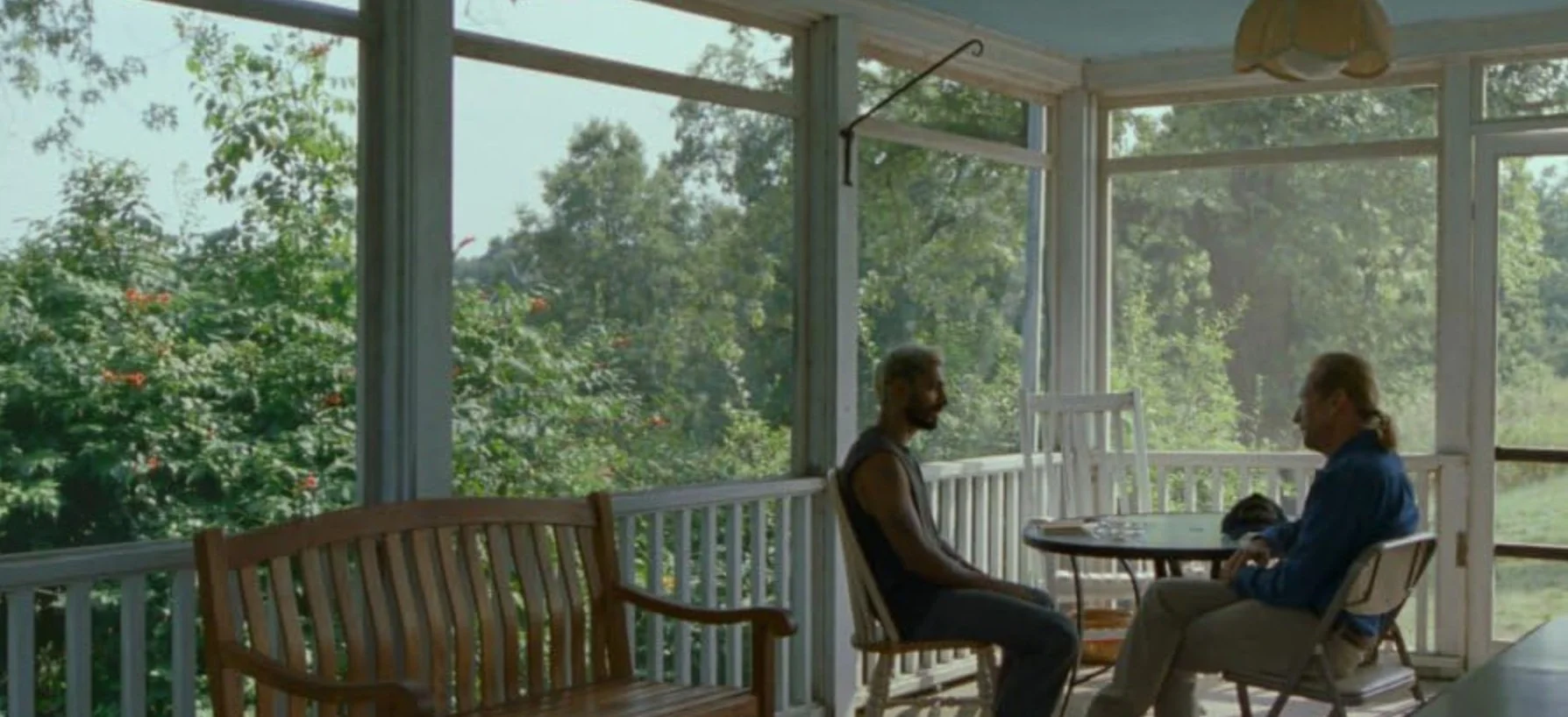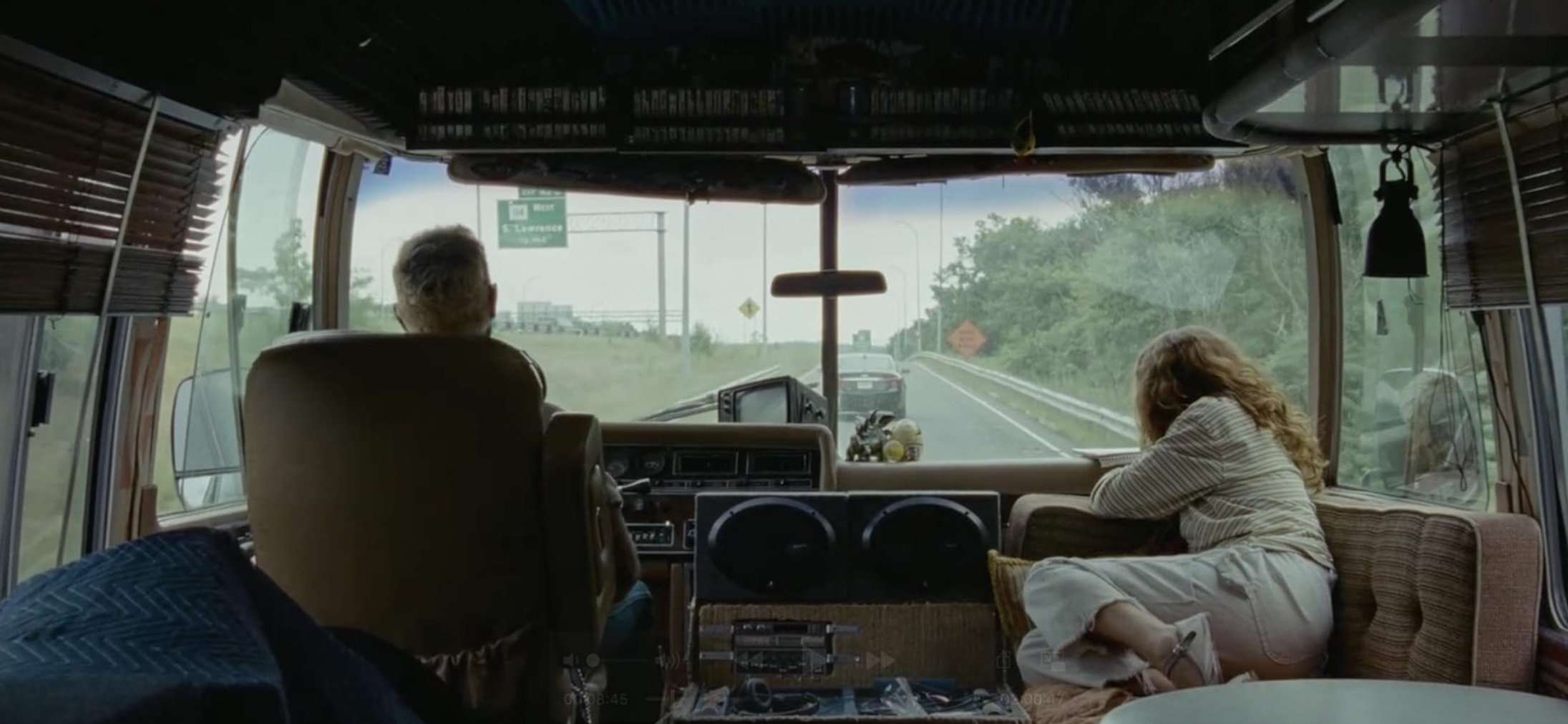SOUND OF METAL
It's in the moments of stillness when we can truly hear ourselves.
Riz Ahmed and Paul Raci in Sound of Metal. 📷 IMDB.
The first image we see in Darius Marder’s directorial debut, Sound of Metal (2019) is of actor Riz Ahmed as punk-metal drummer Ruben Stone – muscles jacked, skin sweaty and tattooed, hair bleached, and eyes focused. He is listening intently to Lou (Louise), his bandmate and romantic partner played by Olivia Cooke. With powerful intensity in his eyes, Ahmed as Ruben keeps his gaze on Lou, (if only to briefly close his eyes to feel the music) as he waits for his cue, and then hits the drums harder and harder until the song reaches its climax and comes to an end.
In the following scene, Ruben wakes up in the RV the couple shares, and before he does anything, his gaze falls to Lou in the bed beside him. He then performs his morning routine. As we watch him do things like blend up green smoothies, start a coffee drip, and put on a vinyl record, we distinctly hear the sounds of these actions. Throughout the film, we are treated to clips of specific yet universally known sounds: a tree’s leaves rustling in the wind, children laughing, rolling thunder, a train going by somewhere in the distance, the clacking of computer keys, the chirping of crickets in the dark. Immediately it’s as if we’re being told to listen closely and appreciate these seemingly ordinary sounds.
Riz Ahmed as Ruben Stone in Sound of Metal. 📷 IMDB.
Riz Ahmed and Olivia Cooke in Sound of Metal. 📷 IMDB.
Sound of Metal is about a punk-metal drummer who loses his hearing. It’s also about grief, acceptance, community, and learning to love and trust yourself and others.
This story began with the real-life experience of another metal drummer who was starting to lose his hearing: director and screenwriter, Derek Cianfrance (The Place Beyond the Pines, Blue Valentine). Cianfrance worked on the story for years and even began filming it as a hybrid documentary he was calling “Metalhead”. He had to stop filming when he finally got the green light to film Blue Valentine, a script he had also been working on for years.
Rather than let the story die, Cianfrance suggested that his friend and fellow filmmaker Darius Marder “adopt” the story and make the film himself. Marder, who co-wrote The Place Beyond the Pines with Cianfrance, rallied his brother Abraham, a musician and composer who gladly agreed to co-write the screenplay, and what resulted is Sound of Metal.
Riz Ahmed as Ruben Stone in Sound of Metal. 📷 IMDB.
It’s been said repeatedly that films are empathy machines, and Sound of Metal is an exceptional example of this sentiment.
I don’t know what it’s like to be deaf, nor do I know how it feels to be a recovering addict, yet through Riz Ahmed’s performance, I can feel Ruben’s pain and his connection to others as he deals with both of these realities. Riz Ahmed didn’t know how deafness or addiction felt either, but to play the role as authentically as possible, he prepared for months, learning American Sign Language (ASL), connecting with people in the deaf community, training in the gym, and learning to play the drums.
Ahmed’s performance as Ruben is mesmerizing to watch. He delivers intense bursts of emotion, deliberate physical postures and movements, powerful moments of silence, and honest expressions of raw emotion to bring us inside Ruben’s world. Some of the most compelling moments in the film show Ahmed telling us Ruben’s story without speaking. His eyes in particular communicate so much — he is a soulful, serious actor, and the way he embodies his characters is remarkable.
Marder and his cinematographer Daniël Bouquet bring us even further into Ruben’s world with their cinematic choices.
From the moment Ruben starts to notice his hearing loss, Marder chooses to place the camera right behind and often to one side of Ruben’s head. Now, we hear what Ruben hears: muted, muffled sounds; tinny, high-pitched, distorted noises — or nothing at all.
In contrast, when the camera moves back into a wide shot, we hear more clearly, as we have been moved back to being an objective viewer who is outside of Ruben’s world. Two examples of this are: the scene in which Ruben goes to the pharmacy and the scene in which he undergoes his first hearing test.
The film was shot using 35 mm film, often with the use of handheld cameras. These choices lend well to the authentic, intimate feeling of the story, where the focus is more on Ruben’s internal struggle than anything else. Marder also employs nature motifs to help tell the story, for example, at different points in the film, tall trees seem to either loom in the darkness or serve as a guiding light as the sun peeks through them.
Sound of Metal’s impressive, unique sound design is a major character in the film that you can’t ignore — it’s a massive reason why this film is so effective in its storytelling, and why it’s a film that will make you feel what Ruben feels. A lot has been written about this by people much more knowledgeable about sound design than me, so if you’re interested, I encourage you to seek out more writing about the choices made by Sound Designer Nicolas Becker and Composer Abraham Marder. One thing I will add is that in addition to the cacophony of sounds and peaceful silences that accompany Ruben on his journey, Abraham Marder’s credits song, “Green”, ends the film on a hauntingly beautiful note.
Throughout the film, Ruben moves through the stages of grief as he struggles to deal with his sudden hearing loss. Although the last stage — acceptance — is only truly felt and communicated in the final scene, glimmers of acceptance are seen when Ruben connects with the deaf children in the ASL class. One of the most powerful scenes of connection and acceptance occurs when Ruben identifies a child in the class who can’t seem to sit still (played by Ezra Marder)*, and he leads him outside to a metal slide in the playground. The child is lying at the top of the slide, and Ruben is sitting at the bottom. Using a form of communication he deeply understands, Ruben taps the metal slide as if it were a drum, and the child rests his head on the slide to feel the vibrations.
Ezra Marder 📷 IMDB
Also during his time with the children in the ASL class, you see Ruben playing, laughing, and smiling. This Ruben feels lighter. He’s also using ASL to communicate, and once Ruben starts signing, captions appear on the screen, where they did not before. We as viewers are experiencing things as Ruben does — we see the captions and understand what’s being signed because Ruben now understands. I failed to notice when the captions disappeared, but if I were to go back, I would guess it might have been after his surgery.
Paul Raci as Joe 📷 IMDB
One of the most heart-wrenching, vulnerable scenes in the film is the one where Ruben returns to the deaf sober house after having cochlear implant surgery. Ruben enters the house and finds Joe sitting at a table with his journal, coffee, and books. Joe has his hand over his face as if he has been crying. He’s surprised to see Ruben. Ruben tells Joe he “did the deed”(surgery). Joe is gutted. Communicating with palpable desperation, Ruben asks to borrow money and stay longer at the deaf sober house. Ahmed’s acting in the scene vibrates with Ruben’s sense of restlessness and self-loathing and is an interesting contrast to Paul Raci’s stoic vulnerability as Joe.
One word came to mind when I watched this scene: humanity. On the surface, the scene is one of many conversations Joe and Ruben have while seated at a table. However, what is powerful and profound is the emotion and connection between the two men. In my research for this review, I learned that both of Paul Raci’s parents were deaf, and like the character, he also served in Vietnam and battled addiction. What a unique gift that must have been for him, to play a character whose life experiences he truly understood. What had me weeping was the emotion between him and Riz Ahmed in the scene.
It was as if this was a scene between a father and a son. The father loves his son so much, and more than anything would love for him to stay with him, but he knows that the best way to love him is to not enable him; rather to let him go and find his own way. The tension between these two characters had me recalling Steve Carell’s achingly beautiful portrayal of David Sheff in Felix Van Groeningen’s Beautiful Boy (2018) as he navigated his son Nic’s (Timothée Chalamet) addiction.
L to R: Timothée Chalamet as Nic Sheff and Steve Carell as David Sheff in Beautiful Boy. 📷 IMDB
Sound of Metal begins with the thunderous sounds of drumming, and it ends with the stillness of silence. Ruben has finally reached a place in his journey where he can begin to accept his deafness, and perhaps begin to accept himself.
Bravo to everyone involved in this film for bringing this human story to the screen.
watch this: feel that rating — 4.5/5
Favourite Scenes:
Outside at a playground slide, Ruben connects with a deaf child who has an energy that likely reminds him of himself.
Ruben asks Joe if he can borrow money and stay at the deaf sober house for a while.
Favourite Lines:
“It's very important — if you want to be here — to understand we're looking for a solution to this (points at forehead), not this (points at ears).”
“It’s ok, Lou.”
*The child in the playground scene is played by Ezra Marder, Darius Marder’s son, who tragically died young from a long illness. I was saddened to read this news while preparing this review, but I was touched to learn more about the real boy who played this small but powerful role in the film through his beautiful obituary.
watch this: feel that is a Substack newsletter I write that shares film & TV recommendations for the mood you're in, or how you want to feel.
Visit watch this: feel that and subscribe for more film & TV reviews and recommendations.







